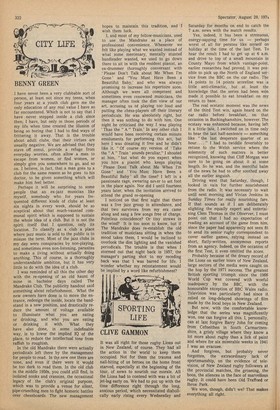BENNY GREEN
I have never been a very clubbable sort of person, at least not since my teens, when four years at a youth club gave me the only education of any real value I have so far encountered. Which is not to say that I have never stepped inside a club since then; I have, but only in those periods of my life when time created the illusion of being so boring that I had to find ways of frittering it away. That is the trouble about adult clubs, that their virtues are usually negative. We are advised that they stave off ennui, provide a refuge from everyday worries, often allow a man to escape from women, or find women, or simply give you somewhere to go, and so on. I believe, in fact, that a man goes to a club for the same reason as he goes to his doctor, to be given something which will make him feel better.
Perhaps it will be surprising to some people that an ex-jazz musician like myself, somebody who for years frequented different kinds of clubs at least six nights in every week, should be so sceptical about that much-vaunted communal spirit which is supposed to sustain the whole idea of a club. But it is not the spirit itself that I question, only its location. To classify as a club a place where jazz music is sold to the public is to misuse the term. Most of the jazz clubs in my day were conspiracies by non-playing, and sometimes even non-listening, parasites to make a living without actually doing anything. This of course, is a thoroughly understandable ambition, but it has very little to do with the idea of a club.
I was reminded of all this the other day with the re-opening of an old haunt of mine in bachelor days called The Mandrake Club. The publicity handout said something about refurbishment. What the new owners have done is to move the entrance, redesign the inside, locate the bandstand in a new position, and drastically re duce the amount of voltage available to illuminate what you are eating or drinking, and who you are eating or drinking it with. What they have also done, in some indefinable way, is to lower the implied IQ of the place, to reduce the intellectual tone from raffish to roughish.
In the old Mandrake there were actually periodicals left there by the management for people to read. In the new one there are none, and even if there were it would be too dark to read them. In the old club in the middle 1950s, you could still find, in isolated nooks and crannies, the occasional legacy of the club's original purpose, which was to provide a venue for silent, pipe-crunching men to fight homeric battles over chessboards. The new management hopes to maintain this tradition, and I wish them luck.
1, and most of my fellow-musicians, used to use the Mandrake as a place of professional convenience. Whenever we felt like playing what we wanted instead of what some mercenary, mentally stunted bandleader wanted, we used to go down there to sit in with the resident pianist, an ex-drummer thoroughly conversant with 'Please Don't Talk about Me When I'm Gone' and "You Must Have Been a Beautiful Baby,' and who was always promising to increase his repertoire soon. Although we were all competent and sometimes even renowned musicians, the manager often took the dim view of our art, accusing us of playing too loud and putting the chess-players off their literary periodicals. He was absolutely right, but then it was nothing to do with him. One night he criticised the way I was playing ' Tkae the " A " Train.' In any other club I would have been receiving certain minute emoluments for performing this act, but here I was donating it free and he didn't like it. " Of course my version of 'Take the "A " Train ' sounds peculiar," I shouted at him, "but what do you expect when you hire a pianist who keeps playing 'Please Dont Talk about Me When I'm Gone' and 'You Must Have Been a Beautiful Baby' all the time? I left in a passionate rage, swearing never to set foot in the place again. Nor did I until fourteen years later, when the invitation arrived to attend the grand re-opening
I noticed on that first night that there was a live jazz group in attendance, and that two survivors from my era came along and sang a few songs free of charge. Pointless coincidence? Or tiny straws in the wind? It is too soon to know, but if The Mandrake does re-establish the old tradition of musicians sitting in when the mood takes them, I would be inclined to overlook the dim lighting and the vanished periodicals. The trouble is that when I stormed out that night back in 1957, the manager's parting shot to my receding back was that I was barred for life. I wonder whether my reinstatement would be implied by a word like refurbishment?


































 Previous page
Previous page